|
Comparing Amelia
Earhart To The Post-War Irene O'Crowley
Craigmile (Surname 'Bolam' added
in 1958)
|
1
|
2
|
3
|
|
The study results showed that there were three different Twentieth Century
women who were attributed to the same Irene O'Crowley Craigmile identity.
Above on the left is the original Irene O'Crowley Craigmile
in 1930, shown between her husband, Charles James Craigmile, and her father, Richard Joseph O'Crowley. Above in the center
is the surrogate mother of the original Irene O'Crowley Craigmile's 1934 born son, who was attributed to the same identity
of Irene O'Crowley Craigmile. Above on the right is the former Amelia Earhart in 1965, alive and well, living as
the third Irene O'Crowley Craigmile. Irene #3 may not look like the Amelia Earhart that people recalled, until they observed
the digital transition below that illuminated the inarguable congruence:
|
Amelia and Amelia + post-1940 Irene in a digital composite.
|
Amelia
|
Post-1940 Irene & Amelia digitally combined
|
Accredited Digital Face
Recognition programs arrived in the Twenty First Century
|
|
Amelia Earhart, 1937
|
Post-1940 Irene & Amelia digitally combined
|
Digital Face Recognition grid common to the post-1940 Irene O'Crowley Craigmile and Amelia Earhart
|
Above and below, notice from the shoulders up, necks and postures were also the same. As it turned out, head-to-toe, Amelia Earhart and the post-war Irene were identical because they were in fact, one in the same human being, albeit with different identities applied.
The post-1940 Irene O'Crowley Craigmile-Bolam in 1965.
Five frames transition:
|
~~~ About truth: "All truth passes through
three stages. First, it is ridiculed. Second, it is violently opposed. Third, it is accepted as being self-evident." Arthur Schopenhauer
~~~
On preventing the discovery of
truth:
"The discovery of truth is prevented
most effectively by preconceived opinion and prejudice." Arthur Schopenhauer
|
[Note: Digital Face Recognition is a forensic comparison tool that was not available until recently.]
The unprecedented, 'Amelia Earhart as compared to Irene
O'Crowley Craigmile' forensic study marked the first comprehensive analysis of its kind on record. As mentioned it used
Digital Face Recognition technology, that when combined with other physical and character trait comparisons ultimately conveyed how the post-World
War Two only 'Irene O'Crowley Craigmile' was not the original Irene O'Crowley Craigmile. Instead, it affirmed
she had previously been known as Amelia Earhart to such an obvious level, that to further deny the reality of it equated to
being in denial.
|
Senator Hiram Bingham & Amelia Earhart
|
|
|
|
Post-War Irene and Amelia digitally combined
|
The post-war Irene O'Crowley Craigmile; features darkened for the digital combination enhancement.
|
Above and below find
domparison samples showing the post-World War Two Irene O'Crowley Craigmile's image digitally combined with Amelia Earhart's
image. Important sounding people
will try to tell you otherwise, but the post-war
Irene definitely did used to be known as, Amelia Earhart.
|
Amelia Earhart
|
Amelia and her future 'Irene' self digitally combined
|
The former Amelia Earhart living as the post-World
War Two Irene O'Crowley Craigmile at her 1970 press conference. She had no choice but to deny her famous past.
|
Above is an exhausted--nearly hard to recognize--Amelia
Earhart. This photo was taken just before she went missing in 1937, a few weeks
shy of her fortieth birthday.
In the late 1990s, prior to the commencement of the analysis,
no one had forensically compared the person of Irene O'Crowley Craigmile to Amelia Earhart before. This is true, even though
the assertion stating Irene O'Crowley Craigmile used to be known as Amelia Earhart, that made a national news in 1970, was
never actually disproved.
The post-World War Two only Irene O'Crowley
Craigmile was not the original Irene O'Crowley Craigmile. Since 1970, however, when she was implicated to have been
the former Amelia Earhart, her own denials and other obfuscations about her past threw off the curious. Amelia's family and
the original Irene O'Crowley Craigmile's family also decried the assertion, and the Smithsonian Institution played it down
enough to where people
felt further suspicion was unnecessary. In the meantime, the U.S. federal
government and its Department of Justice offered no opinion. As part
of the overal comparison Study, though, a Digital Face Recognition analysis affirmed the compared facial templates
of the post-war only Irene O'Crowley and Amelia Earhart to be attributable to the same human being.
|
The original Irene O'Crowley Craigmile, shown next to her plane in 1933. She was commonly referred to as, 'Irene Craigmile' as listed below:
|
Amelia Earhart in 1921. In 1928, when she was thirty
years old she
suddenly became famous. Soon after that she met Irene O'Crowley Craigmile. In 1937, Amelia
was declared a missing person. In 1939, to release her estate to her next of kin,
she was legally
declared, 'dead in absentia' after no satisfactory explanation to account for what became
of her was given.
|
Above are Charles Craigmile, far left, his
wife, the original Irene, center, and the original Irene's father, Richard Joseph O'Crowley. To the right find
enhanced versions. As for the photo definition, clear images of
the original Irene O'Crowley
Craigmile were purposefully removed from circulation long ago. Below,
a September 1932 newspaper reports the death of Charles Craigmile:
The above mentions came from Charles
James Craigmile's 1931 obituary.
According to history, after Charles
Craigmile died in 1931, the original Irene O'Crowley Craigmile did become a pilot. Below is a 1932 newspaper photo (again
of low quality) showing Irene with
a number of other lady pilots--including
Amelia Earhart. Irene is outlined in black, Amelia is outlined in white. (Pilot Viola Gentry is seated on Irene's right.)
History also says Irene remarried twice--the
last time in 1958--to Guy Bolam of England. Except the original Irene O'Crowley Craigmile never married Guy Bolam in 1958. The post-World War
Two Irene O'Crowley Craigmile was the one who married Guy Bolam, and that is why she is seen listed as "Mrs. Guy
Bolam" in the 1974 news article below:
|
This article lead-in appeared in a 1974 newspaper that was tracking
the New York defamation lawsuit case of Bolam VS McGraw-Hill, Gervais, and Klaas. In 1970, McGraw-Hill published a
book that claimed Mrs. Guy Bolam, full name, "Irene O'Crowley Craigmile-Bolam", was the former Amelia Earhart
who had assumed the left-over identity of the original Irene O'Crowley Craigmile during the World
War Two era. Although McGraw-Hill was fined for poor fact checking when it came to some of the information contained in its
book, the 'past identity of Mrs. Guy Bolam claim' was left unresolved.
|
Again, the post-World War Two Irene O'Crowley Craigmile-Bolam
in 1977. She was identified nowhere as 'Irene' prior to the end of World War Two. In a recent comparison study, the first
one ever done, (see some samples
below) head-to-toe and character trait
wise she proved to be a perfect match to Amelia Earhart.
|
~~~ Most everyone recalls the legendary pilot, Amelia Earhart, the
first woman to solo a plane across the Atlantic Ocean--who later went missing amid inordinate circumstances.
What people never came to terms with until recent years, because it was never properly
displayed before, was how after World War Two, Irene O'Crowley Craigmile suddenly looked just like her 1937 gone-missing friend,
Amelia Earhart.
| |
Above: 1976 in Dubrovnik, Yugoslavia. (Dubrovnik is now in Croatia.)
|
| POST WAR ONLY IRENE O'CROWLEY CRAIGMILE VS AMELIA |
|
|
| TOP: AMELIA BECOMES IRENE. BOTTOM: IRENE BECOMES AMELIA |
What Did The First-Ever Forensic Comparison Analysis
Reveal About The Never Disproved, 'Amelia Earhart Became Known As Irene O'Crowley Craigmile' Assertion: That
It Was True.
|
Above: Distinguished and proud with her trademark wings and pearls is the post-World
War Two only, 'Irene O'Crowley
Craigmile'. (Surname 'Bolam'
added in 1958.) She was identified
nowhere as 'Irene' prior to the end of
World War Two. During the post-war era she emerged from out of the blue working at
a bank in Mineola, New York, close to the Long Island airfield where she chartered the 99's women's flying organization seventeen years earlier. Anymore it is obvious, she was not the original, Irene O'Crowley Craigmile. Rather, she was the former Amelia Earhart.
~~~
|
|
Shirley Dobson Gilroy's classic 1985, "artistic
tribute to Amelia Earhart"
book, Amelia / Pilot In Pearls
|
|
"All the admirals and generals seemed to know her." LPGA promoter, Peter Bussatti, in 1982, comments above about
his friend, the post-World War Two only Irene O'Crowley Craigmile-Bolam. Mr. Busatti was well liked by famous LPGA golfers, including Nancy Lopez, Sandra
Palmer, Janey Blalock, and Kathy Whitworth. His death from cancer in 1988 when he was only 57, was considered a great loss
to the LPGA community. Below: The post-war only Irene with LPGA promoter, Peter Busatti in 1975
Above left, the post-World War
Two only Irene O'Crowley Craigmile; Above center, the post-war only Irene & Amelia superimposed;
Above right, a profile photo of Amelia Earhart.
"Peter
Busatti said he accompanied Mrs. Bolam to the Wings Club in New York City
on one occasion. He said a full length portrait of Amelia Earhart hangs in the room dedicated in her honor. ""It
was a dead ringer for Irene,"" he said. ""Sometimes I thought she was, sometimes I thought
she wasn't. Once when I asked her directly she replied, "When I die you'll find out,"" Busatti said. At a Wings Club event in Washington, Busatti
mentioned how, ""All the admirals and generals seemed to know her."" Excerpted from a 1982 New Jersey
News Tribune article where when interviewed, Mr. Busatti openly commented about his suspicion that
his 1970s' & 80s' friend, the post-World War Two only Irene O'Crowley Craigmile-Bolam, used to be known as, "Amelia
Earhart."
Above, friends Eleanor Roosevelt and Amelia Earhart.
Below,
the post-World
War Two Irene O'Crowley Craigmile's 1965 photographed image is digitally combined with Amelia's.
|
|
| The post-war only Irene's eyes over Amelia's |
|
|
| They align perfectly because they were the same eyes |
|
|
Below:
Close-up, Amelia's eyes:
Below: Close-up, the post-war Irene's
eyes:
Below: Amelia's &
the post-war Irene's eyes digitally combined displayed a perfect match pupil to pupil; tear-duct to tear-duct.
|
| 1976, the Post-War only Irene O'Crowley Craigmile |
|
|
|
|
|
|
|
|
| THE POST WAR ONLY IRENE O'CROWLEY CRAIGMILE-BOLAM, 1965 |
|
Left
and Right, where one has trouble recognizing the former Amelia Earhart in either of these two '1965 & 1970' photos,
this is understandable. Except the same person is in both photos and she did used to be known as Amelia Earhart. The image
of any particular individual may sometimes be hard to recognize as one in the same depending on expression, pose, lighting,
and in the former Amelia Earhart's case of course, an age difference that included style changes in both hair and clothing.
There's also Amelia herself during the 1930s. For example, take a look at the two photos of her below taken about a year apart
from each other:
|
|
|
| THE POST WAR ONLY IRENE O'CROWLEY CRAIGMILE-BOLAM, 1970 |
|
|
|
Photographs of Amelia Earhart are plenty but they are
not always consistently recognizable. In this example, when one compares the 1937 photo of her on the left to the 1936 photo
of her on the right, it's hard to see the same person, even though the photos were taken only a year apart from each other.
The photo on the left is used again in the 'Another Perspective' section a little further down.
|
|
|
|
|
| GRACE MURIEL EARHART MORRISSEY, AMELIA'S SISTER |
|
|
|
| POST-WAR ONLY IRENE O'CROWLEY CRAIGMILE, FKA 'AMELIA' |
|
The New Earhart
Reality People
familiar with the 'Irene-Amelia' controversy from the 1970s, likely recall hearing about Irene O'Crowley
Craigmile, the 1930s' pilot who in 1965, averred she used to 'know' and had 'often flown' with
Amelia Earhart. The results of the 'Digital Face Recognition' comparison
study have determined there was more than one person attributed to the same 'Irene Craigmile' identity. Definitively,
combined with ID placements made by the original Irene O'Crowley Craigmile's extended family (foremost her 1934 born son)
as part of the study, DFR verified this reality. The analysis also verified that one of the
Irene O'Crowley Craigmile's appeared nowhere identified as 'Irene' prior to the end of World War Two. As well, and significantly, according
to the study results the one that only appeared as 'Irene Craigmile' after World War Two
exhibited a complete human congruence to Amelia Earhart, the famous pilot who went 'missing' in 1937. To claim that
the original Irene O'Crowley Craigmile and Amelia Earhart were veritable clones would also be nothing short of ridiculous.
The following tells us why:
The post-war only Irene O'Crowley Craigmile-Bolam and Guy Bolam, who she wed in 1958, together in Japan in 1963.
Handwriting A sample from the 'Character Traits' section of the analysis.
Below, a 1967 handwritten line from the post-World
War Two only Irene Craigmile-Bolam, describes two pilot friends she knew in the 1930s when
she was known as 'Amelia Earhart' whom she knew again in her later-life years whe she was known as 'Irene
Craigmile' and after 1958 as 'Irene Bolam'. The line is cryptically phrased but displayed how she recognized herself to be
a different person after the war years. The
pilots she referred to were Viola Gentry and Elmo Pickerill. Both had known her as 'Amelia' in the 1930s, then again
as 'Irene' in her later years.
Below is Amelia's own 'Amelia M Earhart' signature
the way it appeared on a form
she filled out in high school. The
likeness of both handwriting styles was not a coincidence because they were written by the same individual.
Note: As an adult, Amelia's handwriting varied significantly
depending on who she was writing to or the circumstances she was dealing with. It could be neat and formal or rushed and
loopy. As Irene her handwriting style was the same of course, although she was more consistently 'neat.'
Below, from the Character Traits comparison study, some of the post-World War Two only Irene
Craigmile's cursive letters are shown on the left, and some cursive letter samples from when she was known as Amelia Earhart
are shown on the right:
Note: The above comparisons are part of the extensive Document
Examination portion of the analysis.
|
1970, the former Amelia Earhart, AKA, the
post-war Irene O'Crowley Craigmile (Bolam), faces the press
to defend her honor and dignity, and her right to keep on living the private life she preferred and had grown accustomed to.
|
In the decades that followed 1970, Joseph
A. Gervais, who discovered Amelia living as Irene, continued to be interviewed on television, all the while insisting no
matter what anyone else believed, the Irene who he met and photographed in 1965, most definitely was the former Amelia Earhart. He died in 2005, having never disavowed his certainty about it, and in the end he
was proved to have been correct.
|
~~~ Intro to the Comparison Analysis
The few samples above are part of a
large scale 'head-to-toe
physical' and 'character traits' Irene Craigmile to Amelia Earhart
forensic comparison study achieved during the past two decades. The complete study determined an overall congruence existed
between the post-World War Two only Irene Craigmile and Amelia Earhart, to the point of
exhibiting one in the same human being who went by different names in different eras. Most who remember the controversial 'Amelia
became Irene' assertion making national news in 1970, had dismissed it at some point. When the Twentieth Century came to a close,
however, the debate over who Irene Craigmile really was, or used to be, had not gone away, and the comparison analysis was called for when it was realized the
'Amelia Earhart became known as Irene Craigmile' assertion was never forensically settled. As well, there was
no record of a human comparison analysis having been done before. A current lack of awareness about this is mostly attributed
to the combined posturing of the Smithsonian Institution and the National Geographic Society. From the beginning, both made
no effort to prove the controversial 'Amelia became Irene' assertion true or false after it surfaced. Instead,
they automatically refused to endorse it, let alone take it seriously. Hindsight shows them favoring a viewpoint suggesting
it was absurd to even consider the idea of Amelia Earhart
somehow surviving her 1937 disappearance and assuming a different identity. (A shared viewpoint that never changed much.)
The
'pro' argument included Amelia Earhart changing her name during the World War Two era not only for the sake of her future
privacy, but in the interest of post-World War Two era 'geopolitical politeness' as well, so countries
recently at war with each other (in the former Amelia Earhart's case, Japan and the United States) might better segue
into their new, friendlier and more supportive relationships. The 'New Millennium' research analysis thoroughly reviewed the key findings
of formidable 'Earhart disappearance investigators' from years gone by. It was also the first one to orchestrate and then
feature a comprehensive, Irene Craigmile as compared to Amelia Earhart forensic display.
~~~
Above left, the post-World War Two only Irene Craigmile,
AKA "the former Amelia Earhart" in 1964 at a Zonta gathering. Above right, she is superimposed with her former 'Amelia'
self.
|
|
Greta Garbo Another
prime example of an individual who no longer wanted to be recognized as a 'world famous' person. "I never said,
""I want to be alone."" What I did say was, ""I want to be left alone."" The
words of Greta Garbo. [Note: At age 36 in 1941, Greta Garbo chose to abandon her superstar motion picture career in Hollywood. She
never returned to it, opting to live in relative obscurity for the remainder of her days.]
|
Above left: Greta Garbo at the height of
her fame in the mid-1930s. Above right: By the 1960s, nary a soul recognized her anymore when she resided in New York
City's upper east side--and she preferred it that way.
From
early adulthood on, as the decades pass while people age their styles change with the times and their faces grow to look care
worn in the process. For what it's worth, Amelia Earhart managed to age pretty well into her later life years as 'Irene',
as did Greta Garbo. Yet if you went thirty years without seeing either of the individuals in the above and below photos, would
you recognize them for the celebrities they used to be? Not likely.
|
|
| THE FORMER AMELIA EARHART |
|
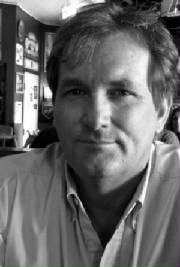
Tod Swindell
|
"Amelia Earhart was almost forty years old when she went missing
in 1937, and while continuing on with her quiet 'post-fame years' existence, by changing her name she outdid Greta Garbo in her quest to further live
a non-public life. As
the former Amelia Earhart grew to old age
she continued to write poetry and to study philosophy, most particularly the writings of Carl Jung. It is clearly time for the
world public to finally know the full value of Amelia Earhart's complete life story.
Nobody is without faults, but Amelia truly was an amazing individual human being in both her younger and older life
forms."
|
|
"The
forensic studies are very convincing.
She was not an ordinary housewife. She was
influential, knew many well placed people and was well
traveled." From an Associated Press article, John Bolam, Irene Craigmile
Bolam's survived brother in law, refers to The Swindell Study's in-progress analysis of Amelia Earhart's disappearance
and 'missing person'
case. After reviewing the preliminary study results, John Bolam further reckoned his past sister-in-law as the former Amelia
Earhart. He first met her in the 1960s, after she had married his brother, Guy, in 1958. ~~~
More On The Original
Irene (O'Crowley) Craigmile The original Irene Craigmile was a real person from the past
who did not resemble her 1930s acquaintance, Amelia Earhart. When the original Irene Craigmile began learning to be a pilot in late 1932,
with introductions offered to flying by Amelia Earhart and one of Amelia's well known pilot friends, Viola Gentry, she was
fortunate to have such great pilots helping her. Viola especially took the original Irene Craigmile under her wing and became
her friend and mentor. Yet, the fun of it was halted within a year, after the original Irene became pregnant and stopped flying.
In August of 1933 she eloped to wed her child to be's father, Alvin Heller, and in early March of 1934 she gave birth to their
son, Clarence Alvin "Larry" Heller. Below is a photo (purportedly) of the original Irene Craigmile
holding her 1934 born son. As it turned out, the original Irene Craigmile's demise was obscured in order to give the still-living,
Amelia Earhart, her identity to use after World War Two. As course had it, the general public was persuaded by the former
Amelia Earhart herself after she was outed against her will in 1970, to believe she was the one and only,
Irene Craigmile. She
wasn't.
By
way of the new millennium study, Amelia's name-change to 'Irene' became an easy to recognize truth within
the conveyance of what ultimately became of Amelia Earhart after she went missing in 1937.
Here is a brief time-line of the original Irene Craigmile's
1930s existence that left her identity available for Amelia Earhart's later-life use: 1.) In 1931, the original
Irene Craigmile's first husband, Charles Craigmile, died from a sudden illness. 2.) A year later, in 1932, the original Irene Craigmile
began taking flying lessons with guidance offered by Amelia Earhart and Viola Gentry. 3.) In 1933, the original Irene Craigmile became pregnant
out of wedlock. 4.) Purportedly, the photo above shows the original Irene Craigmile holding her March of 1934 born son. She
had eloped to 'shotgun' marry the boy's father, one Al Heller, who had served as one of her flying instructors, but their
marriage was subsequently annulled after it was learned Al Heller was still legally married to another woman who he also had
children with. 5.) By 1937, Al Heller had relocated alone to the distant city of Buffalo, New York. Estrangement and a legal
'visiting rights' battle began between he and the original Irene over their 'son' at that time. 6.) After enduring her mid-late 1930s' struggles, that may or may not have led to battles with alcohol
and depression, (Al Heller indicated so much in his legal complaints about her) we may never know why exactly, but by the
time World War Two began the original Irene Craigmile had slipped into oblivion. 7.) In 1993, a later life friend of the original Irene Craigmile's
family, Diana Dawes, spoke of the original Irene Craigmile's death occurring and being 'covered over' in order to enable Amelia
Earhart to further use her identity. (As mentioned, Amelia had known the original Irene Craigmile's prominent aunt through
the Zonta organization. Years later, Diana Dawes grew to know the original Irene Craigmile's son.) The original Irene's 1934
born son was still young enough to be imprinted with a 'surrogate' mother figure at the time, whom he recognized as his 'natural
mother' ever since. (His surrogate mother was neither the original Irene Craigmile nor the former Amelia Earhart.) As well,
at his young age during the World War Two years, the original Irene's son was placed in a boarding school he graduated from
in 1947. 8.)
With the post-war 'former' Amelia Earhart helping to endorse the process, Clarence Alvin 'Larry' Heller, the 1934 born son of the original Irene Craigmile, grew up to become
a pilot for Pan Am Airways. His father, Al Heller, ended up becoming a senior vice president of the Miami Aviation Association.
Note: Miami was a major Pan Am hub for many years and of course, Fred Noonan, Amelia's world flight navigator, had
been one of Pan Am's chief navigators for its overseas Flying Clipper service before he left to navigate for Amelia. (The
old rumor that Fred Noonan was fired from Pan Am for drunkeness and Amelia threw him a bone was not true. In his day, Fred
Noonan was among the best air-over-ocean navigators in the world. He was selected and was 'asked' to participate in Amelia's world flight.)
Above, top row third from left, Fred Noonan is pictured in this
1935 Pan Am China Clipper crew & specs fold-out next to the famous Clipper Capitan, Edwin C. Musick,
center. These formidable aviators were basically viewed in their day on a heroic level similar to the way astronauts would
be decades later. Of note, Captain Musick was among the most famous pilots of his era. He had piloted planes continuously
from 1911 on, logging over a million air-over-ocean miles until his Samoan Clipper tragically
went down near Pago Pago in 1938, killing he and its six crew members in the process. Fred Noonan? Beyond serving as a great Pan Am navigator, he was also a pilot who sometimes
spelled Amelia at the controls during their 1937 world flight. It is ludicrous to even consider the idea of him turning into
an irresponsible drunk during the course of such a carefully monitored journey. The ruse of it was invented though, to try
and place the blame for the duo's failure to spot Howland Island on his shoulders. As it turned out, Howland had been misscharted
by a naval cartographer. Fred Noonan was serving
as the head navigator aboard the China Clipper, shown below left, as it flew over the under-construction
Golden Gate Bridge in 1935 during its famous inaugural flight. Two years later, in 1937, he was on board Amelia Earhart's
Lockheed Electra as it flew over the nearly completed Golden Gate Bridge at the onset of Amelia's first world flight attempt,
below right.
~~~ Back To Irene (O'Crowley) Craigmile "It is true how in the mid-1930s, for a brief period of time the original
Irene Craigmile was a fledgling pilot who was acquainted with Amelia Earhart. What remained unrealized was the way her personal
struggles, followed by her premature demise, became intertwined with Amelia Earhart's ongoing existence after she was declared
'missing' in 1937. This observable reality that finally managed to surface in recent years, is the most important
historical discovery about Amelia Earhart's disappearance and missing person case ever made." Tod Swindell ~~~ Below
is a 1932 Akron, Ohio newspaper photo showing Amelia Earhart outlined in white and the original Irene Craigmile outlined
in black. In the enlargement one can see how the original Irene Craigmile's image is completely unreadable. At the
time this photo was taken, the original Irene Craigmile was not yet a pilot and had yet to begin taking flying lessons.
[Learn more about the original Irene Craigmile's life story further down.]
The 1937 disappearance
of Amelia Earhart and Fred Noonan was ranked by the Associated Press as one of the top ten news stories of the Twentieth Century.
In the United States, no definitive answer to what became of the two was ever given. Overseas, however, in the region they
went missing, a consistent account has always existed pertaining to what actually happened to them, one perpetually
avoided by official United States historians.
|
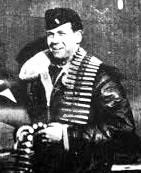
USAF Colonel, Rollin C. Reineck in 1944
|
"Your work relating to Amelia Earhart and Irene O'Crowley Craigmile is absolutely outstanding. There is no other
way to describe it." Author-historian, Colonel
Rollin C. Reineck,
USAF (Ret.) in response to Tod Swindell's Amelia Earhart
investigative forensic research and comparison analysis.
|
|
About The Swindell Study The twenty-year Swindell Study [1997-2017; copyright
registrations: TXu 1-915-926 &
TXu 2-061-539] is an Investigative Research
Evaluation and a Human Comparison Analysis orchestrated and compiled by Tod Swindell, an independent researcher who developed
a great interest in the facts attributed to Amelia Earhart's disappearance and missing person case. The complete Study consists
of over ten-thousand pages and features rare documents, analytical text, photographs, comparisons, maps, charts, and past-obscured but again revisited investigative
research findings. The condensed MSS features 415 total pages; 110 of which contain
logistical and visual elements drawn from the 'Amelia to Irene' Comparison Analysis. The Study elaborates on--and plainly exhibits Amelia Earhart's ongoing
existence after World War Two with the re-purposed name of, 'Irene Craigmile.' (Surname of 'Bolam' added later.) It also examined the post-war reasoning
that left the general public out of the loop of Amelia's ongoing existence with a different name. Simply put, Amelia Earhart
was declared 'dead in absentia' in 1939, and the intention after the war, as co-endorsed by the former Amelia Earhart herself,
was for it to always remain that way. The complete Study is available for review on a selective basis. Questions or comments?
Click on: evandell58@gmail.com
|
Tod Swindell
"In 1996, when I first met renowned Amelia Earhart 'world flight' investigator, Joseph A. Gervais, I was amazed
to find out from him that a thorough forensic study that compared the person of Irene O'Crowley Craigmile-Bolam to Amelia
Earhart had never been done before. So I learned how to orchestrate one from experts and began my journey to get it done.
The quest seemed logical enough; the unsettled
controversy over the enigmatic Irene's past was three decades old by then and Joe Gervais was still insisting she was the
former Amelia Earhart; an insistence he would maintain to his dying day in 2005. Joseph A. Gervais initially began investigating Amelia's odd disappearance circumstances
in 1959. He later asserted how in 1965, when he met Irene O'Crowley Craigmile-Bolam at a gathering of well known pilots in
New York, he felt he recognized her right away and subsequently learned she was not the original Irene O'Crowley
Craigmile. He soon enough realized as well, that what he discovered was something the general public was
never supposed to know. This is the reason the former Amelia Earhart refuted the 1970 book, Amelia Earhart Lives,
that was driven by the discovery Joe Gervais made about her--yet had been published without her cooperation or endorsement.
Her strong rejection of the book is also why it
was swiftly removed from the marketplace. It is interesting to note here, though, in the face of accusations while she was
living as Irene, she never proved she was not the former Amelia Earhart at any time and no one else did either. Today the Irene-Amelia controversy is five-decades old and while the incredible
discovery Joe Gervais made those years ago is now an obvious reality to observe, the obfuscation that diverts it continues."
Tod Swindell Below:
The best selling 1970 book Amelia Earhart Lives by Joe Klaas exposed the truth about Amelia Earhart's ongoing post-war existence as, 'Irene O'Crowley Craigmile, (surname 'Bolam' added in 1958.) It
was published without her cooperation, though, and was removed from the stores after she lawyer'd-up to denounce it. She
had been living her life privately as 'Irene' since the mid-1940s,
and wasn't about to go back to being the famous Amelia Earhart again for her own good reasons, that importantly included
the preference of the U.S. federal government. The book made national news after it was released, causing the former Amelia Earhart to hold a press conference where
she lashed out at its contents before offering with finality, "I am not a mystery woman and I am not Amelia Earhart!"
She then left the conference having fielded no questions.
"Nothing is as invisible as the obvious." Richard
Farson
Why keep avoiding what has grown to become the obvious truth about Amelia Earhart?
|
In 1932, Amelia Earhart, (shown above) became the first
female pilot to solo a plane across the vast expanse of the Atlantic Ocean, and only the second person to do it since Charles
Lindbergh. In
the following years, along with her new friend, Eleanor Roosevelt, Amelia was listed among the most famous
women in the world, a status she maintained until she was declared 'missing' in 1937.
|
Above, Digital Face Recognition revealed Amelia Earhart
and the post-war only, Irene O'Crowley Craigmile-Bolam to be in perfect alignment. It is worth reemphasizing
here, the Irene in this comparison was identified nowhere as 'Irene' before the end of World War Two.
|
|
Amelia Earhart, age 39 in 1937. She was
declared 'missing' three weeks shy of her 40th birthday.
|
Again
above, Digital Face Recognition matched Amelia Earhart's 1937 image (left) to the 1965 photo (below)
of the post-World War Two only, 'Irene O'Crowley Craigmile.' The 1965 photo appeared in the controversial
book, Amelia Earhart Lives, the implicated Amelia Earhart became known as Irene after the war, before it was quickly
vilified by the former Amelia Earhart herself, then was withdrawn by its publisher, McGraw-Hill.
|
|
|
Amelia and Amelia as Irene
|
Amelia, age 31
Amelia as Irene, 1977
|
|
As initiated by the Study results, Digital Face Recognition
went on to confirm face template congruences between all 1930s Amelia Earhart photos that were compared to photos of
the post-World War Two only, Mrs. Irene O'Crowley Craigmile-Bolam. The 'post-war only' Irene
photo used in the above comparison was taken in the mid-1970s. Note her familiar wings, pearls, and broad
white collar.
|
|
|
Amelia Earhart
|
With Amelia's and the post-war only Irene's head-to-toe
physical beings and character traits, The Swindell Study realized a complete match.
|
The post-World War Two only,
Mrs. Irene O'Crowley Craigmile-Bolam
|
|
Above, the former Amelia Earhart in Jamaica in 1976, living as 'Irene O'Crowley Craigmile-Bolam'.
|
"I had
a career as a pilot once, Major, but I gave all that up years ago." 1965 quote from the post-World
War Two Mrs. Irene Craigmile (Bolam), FKA 'Amelia Earhart' as spoken to Major Joseph
A. Gervais, USAF (Ret.) Above photo taken in Jamaica in 1976. (Courtesy
of the Diana Dawes collection.)
|
|
|
Amelia Earhart
|
Amelia and Amelia as Irene, 1970
|
|
|
Amelia as Irene at her 1970 press conference; She had no other choice but to deny her past.
|
Amelia
Earhart became 'a missing person' in 1937, and though she was declared 'dead in absentia' in 1939, she had continued to live-on
and in time assumed the left over identity of Irene Craigmile, a past 1930s acquaintance of hers. Joseph A. Gervais
discovered this truth in the 1960s, although it was never put to the acid test until The Swindell Study commenced in
1997. When the Study was finally completed in 2017, its stark results were too hard to deny:
Amelia
Amelia and Amelia as Irene [When the truth stares back at you it's time to pay attention to it.]
Above: The former Amelia Earhart, living as
'Irene O'Crowley Craigmile-Bolam'
in 1977, looking all of her eighty-years.
|
"My
Mother around 1940," verified in 2006 & 2014 by Larry Heller, the 1934 born
son
of the original Irene O'Crowley Craigmile.
|
The
post-war only Irene O'Crowley Craigmile in 1946, FKA "Amelia Earhart," who was not
recognized by the original Irene's son.
|
The Positive ID Placement Made By Irene Craigmile Bolam's Son:
BELOW is the 2014 written exchange between Clarence
(Larry) Heller, the 1934 born son of the original Irene Craigmile, and Tod Swindell. The woman Mr. Heller positively identified
as his "mother" was not the same woman whose image appeared in the 1970 McGraw-Hill book, Amelia Earhart Lives,
even though according to history she should have been.
Tod Swindell: Thursday,
February 20, 2014
Subject: Verification Hi Larry, I want you to know that I am in full agreement with you that Amelia
Earhart was not your mother. Your mother, as you identified her in these younger
and older version photos, led a very different life than
Amelia and bore little resemblance to her physically. Our agreement on this matter is pertinent to the correct presentation
of the facts. My conveyance is that you
have positively identified these images as those of your late mother, and that she absolutely
was not, and never possibly could have been Amelia Earhart. I agree with this 100%, and understand that you do too. If
you could you send back a simple ‘I agree’ for verification I’d appreciate it. Thanks, Tod
Clarence Alvin 'Larry' Heller: Friday, February 21, 2014
Subject: Re: Identity Verification
The attached pictures are of my mother and she was not Amelia Earhart.
C. Heller Proof is available.
Below, when the above images are combined they equate the same person
in younger and older forms.
Below, combined younger and older images of the post-World War Two
only, Irene Craigmile (Bolam), FKA Amelia Earhart:
|
|
|
The two younger/older photos on the left (1946-1965)
showing the same person, the
former Amelia Earhart, with
close to twenty-years of age difference.
|
Below, what does digital face recognition say about the
following images:
|
Amelia, 1937
|
|
|
| AMELIA AND THE POST-WAR ONLY IRENE |
|
The post-war only, Irene O'Crowley
Craigmile-Bolam
in 1965
|
Again, according to Digital Face Recognition, the 1937 and 1965 facial
images above represent the same person's face in younger and older forms. Below, according to Digital Face Recognition, the
1970s and 1965 facial images do not represent the same person's face. This is because the 1965 Irene Craigmile Bolam
was the former Amelia Earhart, and the 1970s Irene Craigmile Bolam was a different person who had served as the surrogate
mother for the original Irene Craigmile's 1934 born son.
|
Irene
O'Crowley Craigmile-Bolam, 1965
|
Irene O'Crowley Craigmile-Bolam,
1970s
|
Yes, it is hard to believe, but it's true, as edified
in the below comparison. Apparently she had some nasal work done; perhaps a deviated septum rhinoplasty procedure, (according
to Forensic Anthropologist, Dr. Walter S. Birkby) and the retainer she first began wearing when she was known as Amelia,
eventually proved effective in diminishing the gap between her two front teeth. This comparison shows Amelia in the mid-1930s
dissolving into her later self as 'Irene' in the mid-1940s:
|
Amelia Earhart...
|
...transitions into...
|
...her later Irene O'Crowley Craigmile self marking
the post-war
reemergence of, "the pilot in pearls." ©2017 'The 1997-2017 Swindell Study'
|
The original Irene Craigmile & her son, 1934
Below, regarding Monsignor James Francis
Kelley and his sister, Gertrude, Irene's good friends...
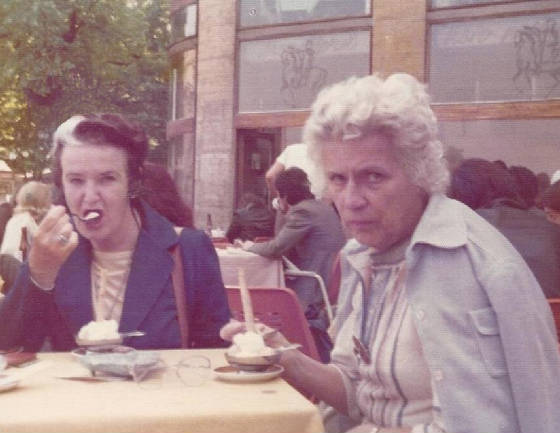
Above in Dubrovnik, Yugoslavia in 1976; Monsignor James
Francis Kelley's sister, Gertrude Kelley Hession is on the left facing forward, next to Irene Craigmile Bolam, who offers
a side glance toward the camera. With a
first look, Irene doesn't appear to resemble Amelia Earhart. The superimposed photo comparisons below tell a different story.
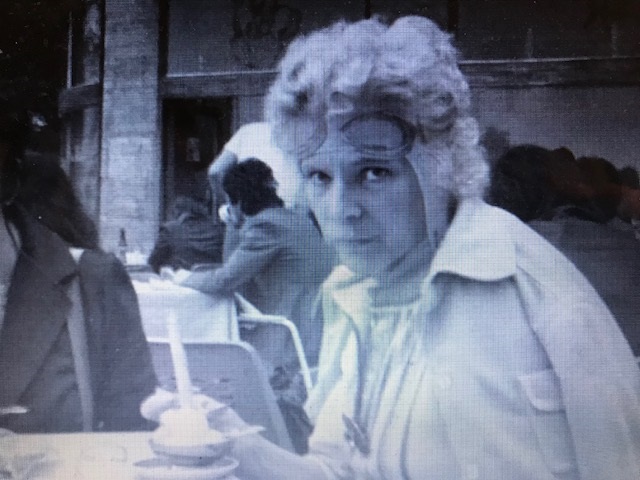
|
Beginning in the 1970s and continuing
to his death in 1996, Gertrude Kelley Hession's brother, Monsignor James Francis Kelley, a prominent priest in the catholic
church who had known both Charles Lindbergh and Amelia Earhart, did describe to certain individuals who later confirmed his
having done so; Donald Dekoster, Helen Barber, and Merril Dean Magley to name a few, that his later-life friend, Irene Craigmile
Bolam used to be known as 'Amelia Earhart' and that he had helped her with her identity change after World War Two
in cooperation with the U.S. justice department and the original Irene Craigmile's O'Crowley family of Newark, New
Jersey. It is true that Monsignor Kelley was an acquaintance of J. Edgar Hoover's, who from the time Amelia
Earhart went missing in 1937 and throughout the World War Two era, paid great attention to Amelia's missing person case that
included maintaining closely guarded FBI files pertaining to it, some revealing ones of which were released after the 1980
FOIA.
|
|
Above, Monsignor
James Francis Kelley, shown in the photo to the right with his good friend, Irene Craigmile Bolam, declined to publicly comment
about her possible "dual identity" in this 1982 article.
|
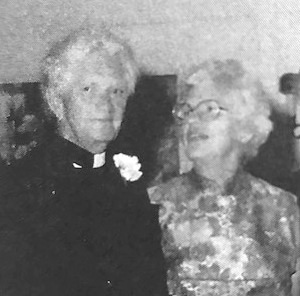
Monsignor James Francis Kelley and his
friend, Irene Craigmile Bolam, in the late 1970s. Monsignor Kelley was the brother of Gertrude Kelley Hession, who is featured
in the Dubrovnik, Yugoslavia photo with Irene. Monsignor Kelley was the president of Seton Hall College from 1936 to 1949.
He held doctorates in psychology and philosophy. In a 1991 taped interview with USAF Colonel Rollin C. Reineck (Ret.), Monsignor
Kelley confirmed that as World War Two ended he received Amelia back from Japan and helped her to become 'Irene Craigmile.'
Earlier (in 1987) Father Kelley had mentioned to Rockville, Illinois TV reporter, Merrill Dean Magley, "After all she'd
been through she didn't want to be Amelia Earhart anymore."
|
|
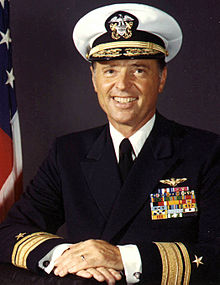
U.S. Navy Rear Admiral, Ernest Eugene (Gene) Tissot Jr.
|
"I have carefully studied your presentation. Your conclusion that there was more
than one Irene O'Crowley Craigmile has completely convinced me that this is indeed the
case. You have also convinced me that one of them used to be Amelia Earhart. Incredible. You have quite an impressive
package there. Keep charging - Gene." From a note sent by
retired U.S. Navy Rear Admiral, Ernest Eugene (Gene) Tissot Jr. to Tod Swindell. Tissot's father, Ernie Tissot was a friend
of Amelia Earhart's who served as her head plane mechanic during her 1935 Hawaii
to Oakland flight. Rear Admiral Tissot was an original key recipient of the study.
|
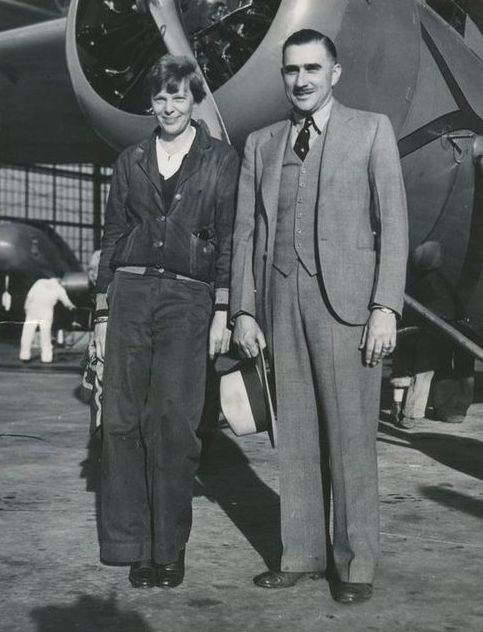
|
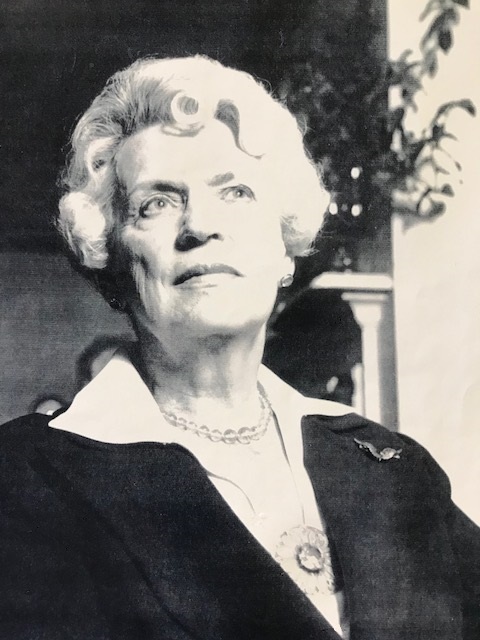
Irene Craigmile Bolam proudly displaying her pilot wings in her 1977
formal photo portrait sitting. On the right she is superimposed with photos of Amelia Earhart.
|
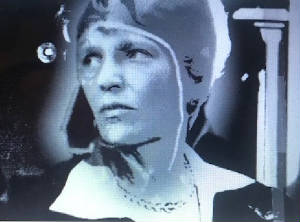
©2017 'The 1997-2017
Swindell Study'
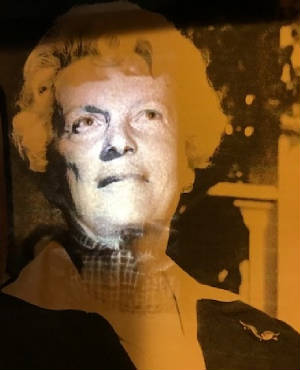
©2017 'The 1997-2017 Swindell Study'
©2017 'The 1997-2017 Swindell Study'
|
|
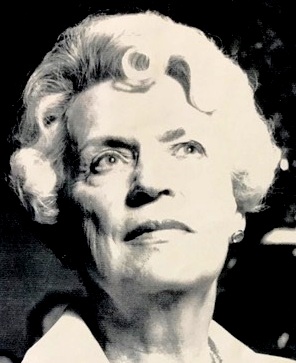
|
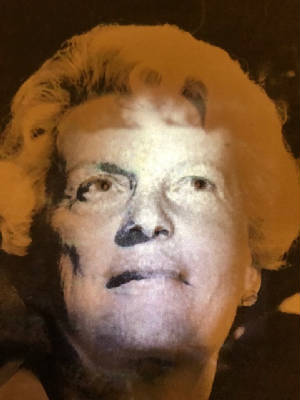
©2017 'The 1997-2017
Swindell Study'
|
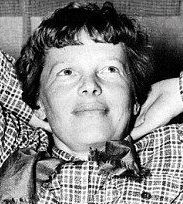
|
Below,
on October 29, 1982, a lavish memorial dinner was held to honor the life of Irene Craigmile Bolam whose death of cancer was
recorded earlier that year on July 7. Her son provided the picture used on the memorial dinner program cover. The dinner was
sponsored by the New Jersey News Tribune newspaper. The publisher of that paper then, John Burk, and been a good friend of
Irene Craigmile Bolam's. The following is a photo-copy of the program cover.
|
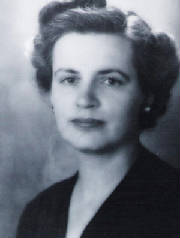
Above, Irene Craigmile in the early 1940s.
Above, Irene Craigmile Bolam in the 1970s.
|
Above, Irene Craigmile in 1946.
Above, Irene Craigmile Bolam in 1965.
|
The 35MM color photograph Joe Gervais took of Irene Craigmile Bolam on August
8, 1965 is the only photograph he would ever take of her. Yet today, it is justifiably likened to the Zapruder film of the
Kennedy assassination taken in Dallas two years earlier, simply because, thanks to the undeniable results delivered by the
Swindell study beginning with the sample below, it revealed the truth about what became of Amelia Earhart after she
went missing in 1937:
|
Rockville, Illinois TV reporter, Merrill Dean Magley
and his wife, Carol, extensivley interviewed Monsignor Kelley in 1987 at the Monsignor's Rumson, New Jersey home. Merrill
Dean Magley was in the process of writing a book about Amelia becoming Irene when he died of cancer in 1991 at the age of
58.
|

In two separate interviews he conducted with original seven Astronaut,
Wally Schirra, pictured above, Merrill Dean Magley was told by Schirra that he had "met" the former Amelia Earhart
at NASA before. During a filmed-interview Magley later conducted with him, the famous astronaut calmly described how he knew
the woman he met at NASA was the former Amelia Earhart, responding to him on camera by saying, "people I considered reliable
had advised me who she was." In 1998, John Bolam, Irene Craigmile Bolam's survived brother in law who believed she was
the former Amelia Earhart, mentioned she was presented an award at NASA in the 1960s.
|
|
Monsignor James Francis Kelley and Archbishop Thomas J. Walsh awarding
FBI Director, J. Edgar Hoover an honorary Law Doctoral Degree from Seton Hall College, 1944.
|
Above, two commendation awards give to Monsignor James Francis Kelley
following the conclusion of World War Two. Reprinted directly from Monsignor Kelley's 1987 Memoirs, he provided no explanation
for the one he received from J. Edgar Hoover, nor did he mention his friend, Irene, anywhere in his book.
|
In 1991, according to Donald B. Dekoster
of Whitehall, Michigan, Monsignor Kelley's friend and St. Croix, U.S. Virgin Islands winter neighbor, (where Mr. Dekoster
owned a home next door to Monsignor Kelley's beautiful hilltop abode) it was 1978 when Monsignor Kelley first described to
him that he, "...had been assigned to receive Amelia Earhart when she came back to the U.S. after the war," and
that she was in, "poor health both physically and emotionally at the time." The Monsignor further described how he periodically,
"served as Amelia's psychiatric priest and spiritual counselor" after that, with Mr. Dekoster specifying that he
still referred to her as "Amelia." Monsignor Kelley flatly told Mr. Dekoster that his good friend, Irene
Craigmile Bolam, used to be known as Amelia Earhart and that she sometimes stayed at at his home in the Virgin Islands. He
also said he would introduce him to her at some point. Donald Dekoster added he was 'disappointed' after an early 1980s
planned get together where he was to meet her did not materialize due to an illness Irene came down with. Disbelievers
were always quick to call the Monsignor "crazy" or "a victim of old-age senility or dementia." Given
what has been learned about this in recent years, however, anymore it's hard to fathom Monsignor Kelley would, or even could
have made such a thing up. Monsignor Kelley had served as the President of Seton Hall College for over a dozen
years while holding doctoral degrees in philosophy and psychology, and he came to know many famous people throughout the
course of his lifetime. Donald Dekoster also countered that when the Monsignor described to him all he did about Amelia
becoming Irene he was, "quite lucid" at the time, adding, "...if he said it, it must be true." Monsignor Kelley's
nephew, Adrian "Red" McBride, who helped to edit his esteemed uncle's 1987 published memoirs, successfully advised
against the inclusion of a chapter the Monsignor wrote about Amelia's journey to becoming Irene within it. In a 2003 phone
interview with Tod Swindell, Red McBride acknowledged having done so, mentioning he found what his uncle described about
his later life friend, Irene, was very hard for him to believe as well, adding he didn't think Irene resembled Amelia in
any way. He also mentioned if what his uncle described about her was at all true then he did not feel it was appropriate
for it to be something announced for the first time in his memoirs. When asked if his uncle suffered from later
life dementia he replied that he did appear to have "senile moments" and "memory lapses" in his last years,
and he was "legally blind" when he died, but he was never diagnosed as having dementia, and he did not have Alzheimer's
disease. He did elaborate that some of the stories his uncle told seemed like such a stretch to him that he wondered if his
memory was mixed-up or if he was just making them up to get attention. A recent book by one Dave Horner that tried to put
an end to the contentious issue over whether or not the Monsignor's statements about Irene Craigmile Bolam were accurate,
strongly argued that Monsignor Kelley completely fabricated what he described about his friend, Irene, quoting Red
Mcbride to have said his uncle was an outright, "bull-shooter" in the process. By now it has
grown to be essentially clear, however, that Monsignor Kelley did not invent some far out false-truth within his memory bank
that left him describing to people from the 1970s on... how his good friend, Irene Craigmile Bolam, used to be known as 'Amelia
Earhart.' Today it is entirely evident he was telling the truth there. In a 1991 tape recorded interview
with Monsignor Kelley conducted by retired USAF Colonel Rollin C. Reineck, the Monsignor mentioned he had some furniture items
Amelia 'gave' to him, he confirmed he was part of the operation that quietly brought Amelia back to the U.S. at the end of
World War Two, and when Colonel Reineck point-blank asked him to verify that his late friend, Irene Craigmile Bolam used to
be known as Amelia Earhart, he plainly replied, "That's right, yes." The interview exists on tape today as part
of Colonel Reineck's own archived Amelia Earhart research materials. Monsignor Kelley sounds calm, matter of fact, and entirely
lucid throughout it. Monsignor
Kelley died in 1996, Colonel Reineck died in 2007, Red McBride died in 2008. Dave Horner's book, The Earhart Enigma, that basically referred to Monsignor
Kelley as all-but 'crazy' to have said what he did about his later life friend, Irene Craigmile Bolam, was published in 2013. Continuing on with the comparison study:
Below: Underneath the two photos featuring Amelia 1930s well-known
pilot friend, Viola Gentry, is a head-to-toe, Irene Craigmile Bolam as compared to Amelia Earhart forensic comparison
example. The 1932 photo used in the comparison features Amelia with Viola and another pilot friend of hers, Elinor Smith in
between the two. The photo of Irene Craigmile Bolam that was used shows her on a bridge in Paris in 1965.
|
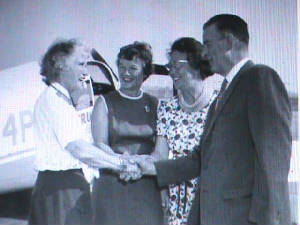
Above, still flying in 1963, Viola Gentry is greeted by Jilly McCormick,
Helen Schlemen, and Dr. D. R. Mallet after delivering new Amelia Earhart covers to Purdue Univesity. Check out the strength
in Viola's forearm.
|
Above, Viola Gentry in 1965 with Irene Craigmile Bolam's British
husband, Guy Bolam. Irene herself, Viola's later life good friend, took this photograph.
|
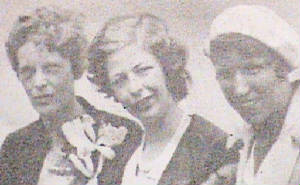
Amelia, Elinor Smith, Viola Gentry
Below, the other Irene Craigmile identified by her son in 2006 &
2014, verified in writing:
Larry Heller was clearly correct: The woman above, who in 2014 he positively identified in writing
to have been his "mother" in both younger ("early 1940s") and older ("1970s") forms, was never
known as, 'Amelia Earhart.'
FORENSICALLY SEPARATING THE IRENES
WHILE ALIGNING ONE WITH AMELIA... Eye Comparison Samples:
Eye rims and spacing must align to achieve a match. They align perfectly when Amelia and the 1946 identified Irene Craigmile
are compared. They do not align when the Irene Craigmile identified by her son are compared to the 1946 identified Irene Craigmile.
See the enlargements compared under these three photos.
|
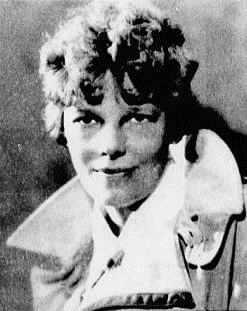
Amelia
|
1946 Irene Craigmile
|
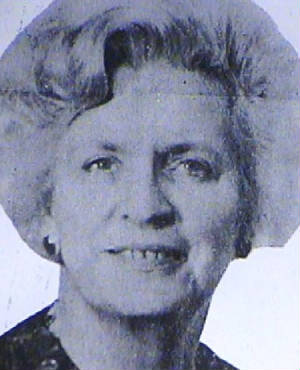
1970s Irene Craigmile identified by her son
|
|
Amelia's eyes:

1946 Irene Craigmile's eyes:

Amelia's and the 1946 Irene's eyes superimposed:

|
Below: The 1946 Irene Craigmile's eyes superimposed
with those of the 1970s Irene Craigmile identified by her son. They do not align properly. Only one eye can align at a time
and not very well. This is because they were different human beings... even though they had the same identity attributed to
them.
"The Forensic studies are very convincing.
She [the Gervais-Irene] was not an ordinary housewife as she claimed. She was influential, knew many well placed people and
was well traveled." From a new millennium
Associated Press article by Ron Staton, John
Bolam refers to his late sister-in-law, the Gervais-Irene Bolam while commenting on the initial results of Protecting Earhart's
Forensic Analysis. The now late John Bolam, who always viewed his sister in law's past as suspect, was the survived
brother of Irene's English husband, Guy Bolam.
The 'Gervais-Irene,' FKA 'Amelia Earhart' first resurfaced
in the United States in the mid-1940s with the new name of 'Irene Craigmile.' She worked in the banking industry on
Long Island, NY until the late-1950s, at which time she married Guy Bolam of England. Mr. Bolam oversaw Radio Luxembourg in
Europe, something the former Amelia Earhart kept doing herself for a few years after Guy died in 1970. ~~~
| Dubrovnik, Yugoslavia 1976 |

|
| Monsignor Kelley's sister, Gertrude Kelley Hession (left) with the Gervais-Irene, FKA 'Earhart' |
More About Protecting Earhart's Comprehensive
Forensic Analysis And Human Comparison Study... Forensic Evidence: "That
suitable for argumentation in a court of law." "For almost fifty-years the 'Amelia became Irene' assertion was generally viewed as a pariah
within general discussions about the mystery of Amelia Earhart's disappearance. In the past two decades, Protecting Earhart's
long-term forensic analysis of the lifetime existence of Irene Bolam caused a major viewpoint shift to occur. Many people
are currently coming to terms with the reality of Amelia's post-loss survival and her eventual name change to Irene Craigmile
at some point during the 1940s, and how after her marriage to Guy Bolam of England in 1958, she further became known as, Mrs.
Irene Bolam." Protecting Earhart's Tod Swindell
"Also,
special recognition to Tod Swindell who undertook an extensive, in-depth forensic analysis of Irene Bolam and Amelia
Earhart, to show the world they were one in the same person." USAF Colonel, Rollin C. Reineck, reprinted from
the Preface in his book, Amelia Earhart Survived. ~~~ How Protecting
Earhart's Historical Forensic Analysis And Human Comparison Study Came To Be...
"I first came up
with the idea of doing an Amelia Earhart-to-Irene Bolam forensic study in 1996. I had been researching Amelia Earhart's disappearance
and it bothered me how the then thirty-years-old and still ongoing controversy about Irene Bolam had never been disproved.
I also found it hard to believe, after learning it directly from World War Two veteran
heroes and famed Amelia Earhart historians, USAF Major Joseph A. Gervais (Ret.) and USAF Colonel Rollin C. Reineck (Ret.),
that the same Irene Bolam, who since the late 1960s Major Gervais had claimed with steadfast certainty used to be known
as Amelia Earhart, had never been forensically compared to Amelia, nor had her full-life story ever been scrutinized in a
conventional forensic manner. Major Gervais described to me then how in 1965, when he met Mrs. Irene Bolam among other
prominent retired pilots in New York, he felt he physically and circumstantially recognized her as the 'former' Amelia Earhart.
He
said his realization was supported by the high level of prominence the other retired pilots regarded Mrs. Bolam with, and
he found it odd that he had never heard of an 'Irene Bolam' since he'd heard of just about every other famous pilot from the
bygone era. Major Gervais had been a formidable pilot himself, one who logged many
flight-time hours while not only serving his country in World War Two, but while serving in the Korean and Vietnam wars as
well. After he met, conversed with and photographed
Mrs. Bolam that summer of 1965, Major Gervais' own five-year follow up investigation left him embracing the
truth about who she used to be. It was a belief he maintained for the remainder of his life, especially in lieu of the fact
that no person or entity ever over-challenged it by proving it wrong. His friend and off-times collaborator, Colonel Reineck
embraced the same reality after his own close examination of Major Gervais' case study. Colonel Reineck as well took same
belief to his grave. Major Gervais and Colonel Reineck died respectively in 2005 and 2007. I became great friends and collaborators
with both of them the last decades of their lives and I will always miss them. Major Gervais' Amelia Earhart research den at his
home that housed his forty-years worth of findings inspired me to no end, but it was after listening to Colonel Reineck's
recorded interview of former Seton Hall College President, Monsignor James Francis Kelley (1902-1996), who outright confirmed
his late close friend, Mrs. Irene Bolam used to be known as 'Amelia Earhart' within it, that I decided it was long overdue
for a forensic analysis to be conducted that would compare the physical beings and character traits of Amelia and Irene Bolam to each other, and that Mrs. Bolam's life-long past should be forensically evaluated as well. A full decade later, after hundreds of combined physical and character trait comparisons, forensic expert consultations
and a tonnage of complementary historical and investigative research--that later culminated with a 2014 in-writing ID placement
made by the son of Irene Bolam that by itself defied recorded history--I was able to draw my own hard conclusion. My
opinion was completely solidified by the way the forensic analysis proved the 'Irene Bolam' identity in question had been
attributed to three different women, and the particular 'Irene' Major Gervais and Colonel Reineck commonly referred to as
the 'former Amelia Earhart' appeared nowhere in the photographic record of Irene Bolam's person prior to the mid-1940s. Instead,
before the mid-1940s, two other women were interchangeably attributed to her same 'Irene' identity. The above findings, when combined with the way the post mid-1940s Irene Bolam in question displayed her head-to-toe
physical congruence to Amelia, and adding it to the way their character traits also aligned, all of this made it easy to
identify how Major Gervais, Colonel Reineck, and Monsignor Kelley, against the grain of conventional history and conventional
reality, were all-along correct about the 'Irene' they referred to, the woman I dubbed the 'Gervais-Irene' in my Protecting
Earhart forensic study, who absolutely, without question, most definitely did used to be known as Amelia Earhart. If a mystery about Amelia Earhart at all exists, it is in the form of how this incredible post-war reality about
her came to be." Protecting Earhart's Tod
Swindell, 2017
| Taroa, Marshall Islands, 1944, Amelia plane match |
|
|
| No matter what one chooses to believe, this information exists. |
|

